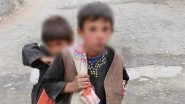Islamabad, Jul 2 (AP) A three-day assembly of Islamic clerics and tribal elders in the Afghan capital concluded Saturday with pledges of support for the Taliban and calls on the international community to recognise the country's Taliban-led government.
The meeting in Kabul was tailored along the lines of Afghanistan's traditional Loya Jirgas — regular councils of elders, leaders and prominent figures meant to deliberate Afghan policy issues.
Also Read | Typhoon Chaba Makes Landfall in China’s Guangdong Province.
But it appeared that the overwhelming majority of attendees were Taliban officials and supporters, mostly Islamic clerics.
Women were not allowed to attend, unlike Loya Jirgas held under a U.S.-backed government in the past.
Also Read | Pakistan: Imran Khan To Hold Public Gathering in Islamabad Against Shehbaz Sharif Govt.
The former insurgents, who have kept a complete lock on decision-making since taking over the country last August, touted the gathering as a forum to hear a range of voices on issues facing Afghanistan.
According to Mujib-ul Rahman Ansari, a cleric who attended the gathering, an 11-point statement released at the end urges countries in the region and the world, the United Nations, Islamic organisations and others to recognise a Taliban-led Afghanistan, remove all sanctions imposed since the Taliban takeover and unfreeze Afghan assets abroad.
Ansari said that more than 4,500 Islamic clerics and elders who attended renewed their allegiance and loyalty to the Taliban's supreme leader and spiritual chief, Haibatullah Akhundzada.
In a surprise development, the reclusive Akhundzada came to Kabul from his base in southern Kandahar province and addressed the gathering on Friday. It was believed to be his first visit to the Afghan capital since the Taliban seized power.
In his hour-long speech carried by state radio, Akhundzada called the Taliban takeover of Afghanistan a “victory for the Muslim world.”
His appearance added symbolic heft to the gathering.
The Taliban are under international pressure to be more inclusive as they struggle with Afghanistan's humanitarian crises.
The international community has been wary of any recognition or cooperation with the Taliban, especially after they restricted the rights of women and minorities — measures that hark back to their harsh rule when they were last in power in the last 1990s.
Saturday's 11-point resolution called on the Taliban government to pay “special attention and to ensure justice, religious and modern education, health, agriculture, industry, the rights of minorities, children, women and the entire nation, according to Islamic holy law."
The Taliban adhere to their own strict interpretation of Islamic law, or Sharia.
Akhundzada, who rose from a low-profile member of the Islamic insurgents to the leader of the Taliban in a swift transition of power after a 2016 U.S. drone strike killed his predecessor, Mullah Akhtar Mansour, also offered prayers Friday for earthquake victims.
The powerful quake in June killed more than 1,000 people in eastern Afghanistan, igniting yet another crisis for the struggling country. Overstretched aid groups already keeping millions of Afghans alive rushed supplies to the quake victims, but most countries responded tepidly to Taliban calls for international help. (AP)
(The above story is verified and authored by Press Trust of India (PTI) staff. PTI, India’s premier news agency, employs more than 400 journalists and 500 stringers to cover almost every district and small town in India.. The views appearing in the above post do not reflect the opinions of LatestLY)













 Quickly
Quickly


